entire issue [pdf 12.7 mb] - Pitt Med - University of Pittsburgh
entire issue [pdf 12.7 mb] - Pitt Med - University of Pittsburgh
entire issue [pdf 12.7 mb] - Pitt Med - University of Pittsburgh
- No tags were found...
Create successful ePaper yourself
Turn your PDF publications into a flip-book with our unique Google optimized e-Paper software.
sabotage our emotional health?Franzen did a pilot study <strong>of</strong> teens in theirall-too-typical state—way more sleep deprivedthan their still-developing brains ought to be.He showed them photographs <strong>of</strong> emotionallycharged scenes and played for them recordings<strong>of</strong> disturbing verbal exchanges, then asked theteens to control their emotional reactions tothese stimuli. Meanwhile, Franzen’s team measuredthe teens’ pupil-dilation responses: “It’ssort <strong>of</strong> an old-school measure [<strong>of</strong> emotional regulation],”he says, “but it’s cheap and easy to do,and it’s noninvasive.” (Pupil dilation also coincideswith cognitive function. So, just to be surethat wasn’t what was behind any changes in theirpeepers, Franzen also observed the kids discussingconflict with their friends and measured signs<strong>of</strong> emotional regulation or lack there<strong>of</strong>.)Sure enough, when Franzen compared thesleep-deprived adolescents to controls, pupilswere about twice as big when the sleepy kidswere exposed to negative stimuli. (Their interactionswith their friends hinted at a similarpattern—dominance, aggression, general shortfusedness.)With a new National Institutes <strong>of</strong> HealthResearch Project Grant (a.k.a. R01 grant) in hand,this summer Franzen is launching a full investigation<strong>of</strong> these pilot-study results, hoping to finallyarrive at the first objective measures <strong>of</strong> impairedemotional control related to sleep deprivation.He’s comparing the results <strong>of</strong> the teen studies tohis previous work with young adults, probing thequestion <strong>of</strong> whether or not adolescents are morevulnerable to the ill effects <strong>of</strong> sleep loss. Andfurther down the road, he plans to tease out howexactly neural circuitry changes when people,especially adolescents, don’t get enough sleep.Even as kids are waking up early for the 8 a.m.school bell, they’re burning the midnight oil—because that’s what they’re hardwired to do, saysFranzen. “At puberty, the desire to stay awake atnight is not just social—there are biological influences,too.”The teen years are such a vulnerable time—“when kids are increasing their risk for development<strong>of</strong> substance abuse and depression,” saysFranzen. He hopes that by showing neural circuitryshifts at work, eventually he can make a case forscreening kids in the clinic and flagging the oneswho may be headed for trouble. “Adolescence isperhaps a unique opportunity to prevent a problemfrom happening in the first place,” he says.SNORING:THE CINDERELLA OF SLEEPThough still underdiagnosed, sleep apnea has gained attention as a seriouspublic-health risk. The evidence continues to pour in. For example, PatrickStrollo—pr<strong>of</strong>essor <strong>of</strong> medicine and <strong>of</strong> clinical and translational science,medical director <strong>of</strong> the UPMC Sleep <strong>Med</strong>icine Center, and codirector <strong>of</strong> theSleep <strong>Med</strong>icine Institute—found a whole new reason these patients have suchpoor outcomes: They have higher levels <strong>of</strong> a particularly bad form <strong>of</strong> arteryhardeningcholesterol called LDL subclass B.But snoring? It’s the other sister, just sort <strong>of</strong> there, like background noise.We’ve always taken for granted that, yes, people who report snoring tend tohave health problems, but that’s just because they have sleep apnea, right? Infive decades <strong>of</strong> research on sleep disturbances and their devastating effect oncardiovascular health, we’ve never really monitored snoring.But a few years ago, when Tom Rice (Fel ’11) began working with Kim Sutton-Tyrrell, a cardiovascular epidemiologist in <strong>Pitt</strong>’s Graduate School <strong>of</strong> PublicHealth, he read an Australian study with a small sample <strong>of</strong> snorers verses nonsnorers.It suggested that sawing logs—or rather, the resulting vibrations inthe neck that rattle the carotid artery—might actually do damage, independent<strong>of</strong> sleep apnea.Piggy-backing on a cardiovascular-risk study <strong>of</strong> Sutton-Tyrrell’s, Rice studiedyoung adults who were overweight but who had not developed cardiovasculardisease, measuring the vibrations in the air flow in their noses as well as theircarotid artery wear and tear over time. The results were more impressive thanhe’d expected: Nonsnorers in the study had healthy, thin carotid walls. Peoplewith sleep apnea, as it’s long been known, have thick carotid artery walls. Butthe snorers in Rice’s study were somewhere in the middle.Snoring, it seems, could be part <strong>of</strong> a gradual progression to heart attacksand strokes.“We don’t know all the reasons sleep apnea leads to cardiovascular disease,”says Rice, who’s now assistant pr<strong>of</strong>essor <strong>of</strong> medicine. He adds that fragmentedsleep and lack <strong>of</strong> oxygen explain some, but not all, <strong>of</strong> it. “[Perhaps] snoringdamages the arteries in the neck and then makes them more susceptible to thedamage from the low oxygen level.”Rice presented the findings from his ongoing, now-NIH-funded study at theInternational Symposium on Sleep and Breathing in Barcelona last spring.Assistant Pr<strong>of</strong>essor <strong>of</strong> Psychiatry Wendy Troxel (PhD ’05), another one <strong>of</strong>the many <strong>Pitt</strong> people who trained here in sleep medicine and stayed to join thefaculty, has also made surprising discoveries regarding this Cinderella <strong>of</strong> sleepdisturbances. In the journal Sleep in 2010, Troxel published the first prospectivestudy showing that people who report snoring and insomnia complaintshad greater risk <strong>of</strong> developing metabolic syndrome, a cluster <strong>of</strong> factors thatincrease the odds <strong>of</strong> getting heart disease. These findings are the first to showthat commonly reported sleep problems, including snoring and difficulty fallingasleep, can predict the onset <strong>of</strong> metabolic syndrome over a three-year followupperiod.Some 40 to 50 percent <strong>of</strong> the U.S. adult population snores, and those arejust the ones we know about. If you sleep alone, or if your better half is sleepingsoundly, you could be a snorer and be none the wiser.16 PITTMED


![entire issue [pdf 12.7 mb] - Pitt Med - University of Pittsburgh](https://img.yumpu.com/49831615/18/500x640/entire-issue-pdf-127-mb-pitt-med-university-of-pittsburgh.jpg)

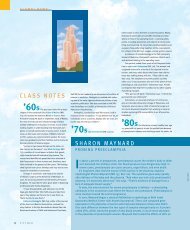
![entire issue [pdf 2.79 mb] - Pitt Med - University of Pittsburgh](https://img.yumpu.com/50435398/1/190x231/entire-issue-pdf-279-mb-pitt-med-university-of-pittsburgh.jpg?quality=85)
![entire issue [pdf 6.47 mb] - Pitt Med - University of Pittsburgh](https://img.yumpu.com/50360689/1/190x231/entire-issue-pdf-647-mb-pitt-med-university-of-pittsburgh.jpg?quality=85)
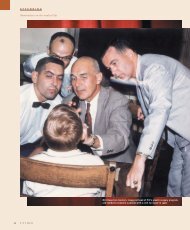
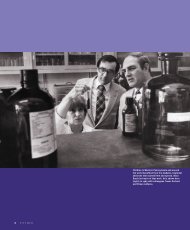
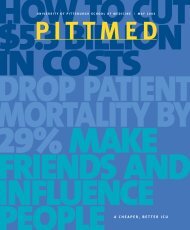
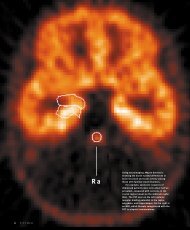
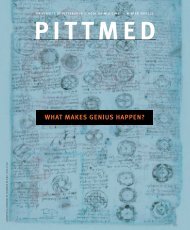


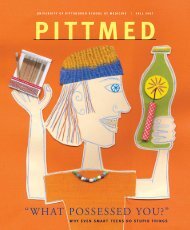
![entire issue [pdf 11.3 mb] - Pitt Med - University of Pittsburgh](https://img.yumpu.com/46685830/1/190x231/entire-issue-pdf-113-mb-pitt-med-university-of-pittsburgh.jpg?quality=85)
![entire issue [pdf 12.7 mb] - Pitt Med - University of Pittsburgh](https://img.yumpu.com/44997419/1/190x231/entire-issue-pdf-127-mb-pitt-med-university-of-pittsburgh.jpg?quality=85)